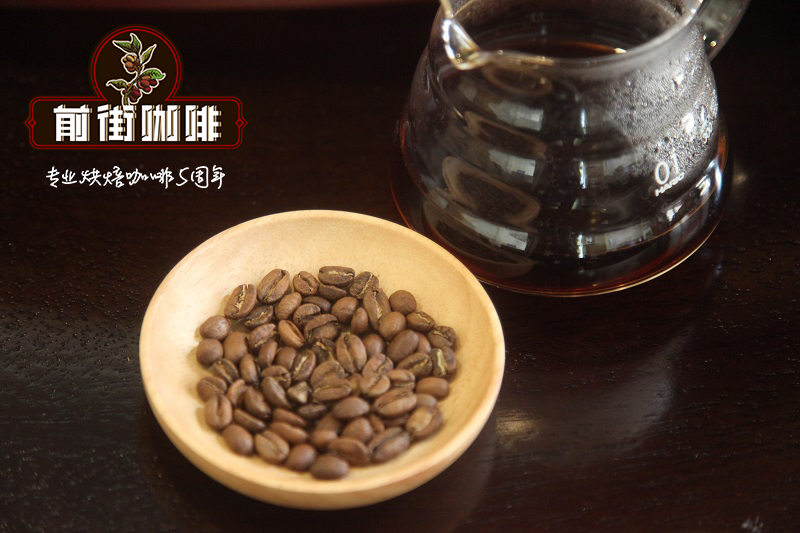Pu'er coffee is called "the best of coffee", which is comparable to Jamaica Blue Mountain Coffee.

Professional coffee knowledge exchange more coffee bean information please follow the coffee workshop (Wechat official account cafe_style)
Formerly known as Simao City, it was once an important post station on the "Ancient Tea-Horse Road". In 2007, with the approval of the State Council of the mainland, the Yunnan provincial government officially changed its name to Pu'er City. Affected by the subtropical monsoon climate, most areas are frost-free all the year round. It is not only one of the important producing areas of famous Pu'er tea, but also one of the largest tea-producing areas in China.
When it comes to Pu'er, people's first reaction is "tea". But in fact, in addition to tea, coffee is also one of the very important local agricultural products, regardless of history or quality, are worth talking about. The history of coffee cultivation in Yunnan can be traced back to hundreds of years ago. It is said that at that time, a French missionary came to Yunnan to preach, asked someone to bring seeds because he missed coffee, and then started the local coffee planting. However, for quite a long time, we did not know the existence of coffee in Yunnan. Although this valuable tropical cash crop has been planted continuously, it has not really appeared in the mass consumer market. It was only in recent years when the coffee boom emerged that people began to pay attention to this coffee producing area in southwest China.
With the supply of high-quality Simao coffee increasing year by year, by 1997, all the small grains of coffee needed by Nestl é's coffee processing plant in Dongguan, Guangdong, were purchased from Yunnan and did not need to be imported from abroad. The successful cooperation between Nestl é and Pu'er prompted the Yunnan provincial government to issue opinions on speeding up the development of coffee industry in 1998, so as to obtain more for Nestl é in Yunnan.
The growth of coffee requires high natural conditions. Because of its special geography, climate and ecological environment, Pu'er coffee grown in Pu'er City is uniform and full, bright in luster, superior in quality, with the characteristics of "strong but not bitter, fragrant but not strong, rich in oil and rich in sour taste". Pu'er coffee is recognized as "the best coffee" by international coffee organizations. In the eyes of coffee experts, Pu'er coffee is "the best coffee". Comparable to Jamaican Blue Mountain Coffee.
In flavor, Pu'er coffee is lighter in taste and aroma, similar to coffee beans in Honduras and Guatemala. High-quality raw materials provide policy support. As of 2017, the planting area of Pu'er coffee has reached 789000 mu, with a total output of 58600 tons of coffee beans, 80% of which are exported abroad.
When growing coffee in Yunnan, first of all, the weather is good. Coffee has a requirement for temperature. It can not be cold in winter. Once it is below 18 ℃, it is easy to freeze to death. You see here, the perennial temperature is not lower than the basic requirement of coffee, so coffee is rarely frozen to death. The only challenge is that there may be frost and hail in spring, but the trees will not freeze to death. That is, it will knock down some coffee flowers and reduce the output. " The coffee garden in Nandaohe Village is about 1200 meters above sea level. Like most of the local coffee gardens in Pu'er, they are built on slopes. The cars can't drive up, so they can only go up step by step. The elevation of a garden sometimes varies from 300 to 400 meters. It's easy to catch breath when going back and forth, but coffee itself is a shade-loving plant, so it can't accept the sun directly. Previously, farmers didn't understand this. Then we must be more professional than them, so we slowly suggest that they plant some shade trees in the coffee fields, so that they can not only protect soil erosion, but also make coffee have a better growing environment. If farmers are willing to plant some cash crops such as litchi and mangoes, then they can also harvest and sell money when they bear fruit, which is also a good way to increase their income. Pu'er has become a coffee bean producing area with high yield and high quality, which has attracted the attention of the global coffee industry, and it is the "coffee capital of China". Nestle's project in Yunnan has also won honors such as the 2012 World Business and Development Award and the 2012 Global Compact China Best practice Award issued by relevant United Nations organizations.
Important Notice :
前街咖啡 FrontStreet Coffee has moved to new addredd:
FrontStreet Coffee Address: 315,Donghua East Road,GuangZhou
Tel:020 38364473
- Prev

Make coffee more environmentally friendly 90 cafes in Wellington will launch zero-waste coffee cups
Professional coffee knowledge exchange more coffee bean information please follow the coffee workshop (Wechat official account cafe_style) Wellington's new "Zero waste Coffee Cup" program will be expanded to about 90 cafes this year, and may expand to Auckland. Nada Piatek, co-founder of the coffee cup company, said the capital's "re-use" of zero-waste coffee last year, according to Stuff News.
- Next

500 million orders for Pu'er Coffee Expo relationship between flavor description of Pu'er coffee and Simao small seed coffee
Professional coffee knowledge exchange more coffee bean information please follow the coffee workshop (Wechat official account cafe_style) Pu'er International Fine Coffee Expo was held a few days ago, 30 coffee industry experts from China and the world commented that the on-the-spot turnover reached 36 million yuan (RMB, the same below), the buyer's order and contract intention transaction volume reached 500 million yuan, and financial institutions provided intention service.
Related
- Can lightly roasted coffee beans be used to extract espresso? How finely should you grind high-quality coffee beans to make Italian latte?
- What is the difference between the world's top rose summer coffee and Yejia Shefi? What are the flavor characteristics of Yega Shefi coffee and Panama rose summer?
- The ceremony is full! Starbucks starts to cut the ribbon at a complimentary coffee station?!
- A whole Michelin meal?! Lucky launches the new "Small Butter Apple Crispy Latte"
- Three tips for adjusting espresso on rainy days! Quickly find the right water temperature, powder, and grinding ratio for espresso!
- How much hot water does it take to brew hanging ear coffee? How does it taste best? Can hot water from the water dispenser be used to make ear drip coffee?
- What grade does Jamaica Blue Mountain No. 1 coffee belong to and how to drink it better? What is the highest grade of Blue Mountain coffee for coffee aristocrats?
- What are the flavor characteristics of the world-famous coffee Blue Mountain No. 1 Golden Mantelin? What are the characteristics of deep-roasted bitter coffee?
- Can I make coffee a second time in an Italian hand-brewed mocha pot? Why can't coffee be brewed several times like tea leaves?
- Hand-brewed coffee flows with a knife and a tornado. How to brew it? What is the proportion of grinding water and water temperature divided into?

